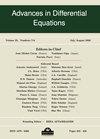Non-local tug-of-war with noise for the geometric
IF 1.9
3区 数学
Q1 MATHEMATICS
引用次数: 3
Abstract
This paper concerns the fractional $p$-Laplace operator $\Delta_p^s$ in non-divergence form, which has been introduced in [Bjorland, Caffarelli, Figalli (2012)]. For any $p\in [2,\infty)$ and $s\in (\frac{1}{2},1)$ we first define two families of non-local, non-linear averaging operators, parametrised by $\epsilon$ and defined for all bounded, Borel functions $u:\mathbb{R}^N\to \mathbb{R}$. We prove that $\Delta_p^s u(x)$ emerges as the $\epsilon^{2s}$-order coefficient in the expansion of the deviation of each $\epsilon$-average from the value $u(x)$, in the limit of the domain of averaging exhausting an appropriate cone in $\mathbb{R}^N$ at the rate $\epsilon\to 0$. Second, we consider the $\epsilon$-dynamic programming principles modeled on the first average, and show that their solutions converge uniformly as $\epsilon\to 0$, to viscosity solutions of the homogeneous non-local Dirichlet problem for $\Delta_p^s$, when posed in a domain $\mathcal{D}$ that satisfies the external cone condition and subject to bounded, uniformly continuous data on $\mathbb{R}^N\setminus \mathcal{D}$. Finally, we interpret such $\epsilon$-approximating solutions as values to the non-local Tug-of-War game with noise. In this game, players choose directions while the game position is updated randomly within the infinite cone that aligns with the specified direction, whose aperture angle depends on $p$ and $N$, and whose $\epsilon$-tip has been removed.非本地拔河与噪音的几何
本文讨论了[Bjorland,Caffarelli,Figalli(2012)]中引入的非散度形式的分式$p$-Laplace算子$\Delta_p^s$。对于任何$p\in[2,\infty)$和$s\in(\frac{1}{2},1$,在$\mathbb{R}^N$中以$\epsilon\到0$的速率耗尽适当圆锥体的平均域的极限内。其次,我们考虑了基于第一平均值建模的$\epsilon$动态规划原理,并证明了当在满足外锥条件且服从有界的域$\mathcal{D}$中提出时,它们的解一致收敛为$\epsilon到0$,收敛于$\Delta_p^s$的齐次非局部Dirichlet问题的粘性解,$\mathbb{R}^N\setminus\mathcal{D}$上的一致连续数据。最后,我们将这种$\epsilon$近似解解释为具有噪声的非局部拔河游戏的值。在这个游戏中,玩家选择方向,同时游戏位置在与指定方向对齐的无限圆锥体内随机更新,其孔径角取决于$p$和$N$,并且其$\epsilon$尖端已被移除。
本文章由计算机程序翻译,如有差异,请以英文原文为准。
求助全文
约1分钟内获得全文
求助全文
来源期刊

Advances in Differential Equations
MATHEMATICS, APPLIED-MATHEMATICS
CiteScore
1.90
自引率
0.00%
发文量
0
审稿时长
>12 weeks
期刊介绍:
Advances in Differential Equations will publish carefully selected, longer research papers on mathematical aspects of differential equations and on applications of the mathematical theory to issues arising in the sciences and in engineering. Papers submitted to this journal should be correct, new and non-trivial. Emphasis will be placed on papers that are judged to be specially timely, and of interest to a substantial number of mathematicians working in this area.
 求助内容:
求助内容: 应助结果提醒方式:
应助结果提醒方式:


